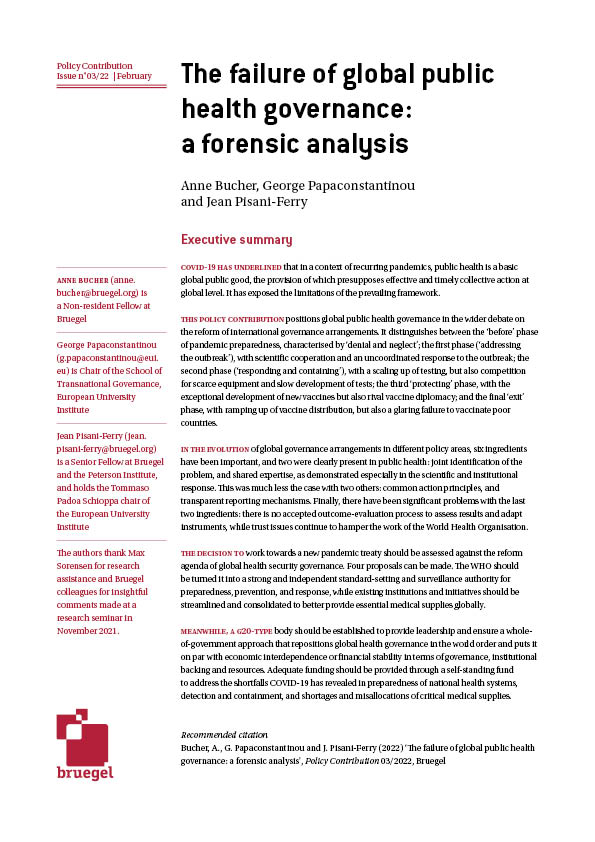Blog Post
Three-quarters of Next Generation EU payments will have to wait until 2023
Because of hurdles in designing, approving and implementing European Union programmes, less than a quarter of the €438 billion in grants planned under the new EU recovery instruments is expected to be spent in the next two and a half years, when recovery needs will be greatest. Well-functioning financial markets can help bridge the gap between urgent spending needs and late-arriving EU disbursements, but more effort is needed to frontload EU payments.
The falling government bond yields of Greece, Italy and Spain reflect the market’s positive assessments of the landmark economic initiatives unveiled last month. Following the 18 May Franco-German proposal, the European Commission proposed a new recovery facility, Next Generation EU, which would borrow money in the name of the European Union to finance EU-wide expenditures. This was a bold move. Primarily aimed at cyclical stabilisation, it would involve redistribution across member states: “Action at the Union level is thus necessary to achieve a fast and robust economic recovery in the Union.” Speed is of the essence, and the proposal rightly emphasised the need to put in place and implement the Next Generation EU instrument quickly. However, a major policy challenge remains unsolved: how to bring forward expected pay-outs from the new EU recovery instrument so that they are early enough to support economic recovery from the pandemic-induced recession.
The incorporation of the temporary Next Generation EU into the EU’s next multiannual budget would take advantage of a well-established framework, already subject to various checks and balances. The temporary instrument would add €433 billion in grants, €67 billion in guarantees and €250 billion in loans (measured at 2018 prices) to the €1,100 billion ‘standard’ seven-year EU budget for 2021-2027. Considering the urgency of EU budget support, the Commission also proposed to add €11.5 billion (at current prices) to the current 2020 annual budget, of which €5 billion would be grants and €6.5 billion would be guarantees.
However, the EU budget is a slow-moving machine. As operational programmes have to be designed, approved and implemented, EU budget commitments are typically paid down over many years (see Figures 1 and 2 here). The Commission has emphasised that commitments from the new recovery instrument should be frontloaded. But expected payment amounts in the Commission’s sectoral regulation proposals are somewhat hidden in annexes. Their aggregation reveals that the proposed recovery instrument will be subjected to the same time constraints as usual (Figure 1).
- Commitments related to the combined €438 billion grant component of Next Generation EU and the 2020 annual budget amendment are indeed frontloaded: 78% of total commitments are scheduled to be agreed in 2020-2022. However, the Commission expects that barely 24.9% of the total new firepower for grants would be spent in 2020-2022, when the recovery needs will be greatest.
- Moreover, these payment plans presuppose 100% absorption rates, while in practice absorption rates vary: for the 2007-2013 budget, national absorption of available structural and cohesion funds ranged from 48% in Croatia to 95% in Estonia and Portugal.
- The time profile for the smaller guarantee component (€73 billion) is similar, with 63% of commitments made in 2020-2022, but only 31% of payments.
- The €250 billion in loans would be fully committed in 2021-2022 and 43% paid out in these two years, supposing 100% demand for loans and, again, a 100% absorption rate.
Since EU debt will be issued to finance the recovery instrument as payments are being made, backloaded payments also imply that the increased supply of safe assets will come rather late.
The Commission expects that barely 24.9% of the total new firepower for grants would be spent in 2020-2022, when the recovery needs will be greatest.
Well-functioning financial markets can help bridge the gap between the urgent recovery needs and the later EU budget pay-outs. Countries could borrow and spend immediately to support their economic recoveries and the EU funds could be used when they will be available later, hence allowing countries to borrow less later. Still, it is crucial to frontload EU payments to support economic recovery.
Recommended citation
Darvas Z. (2020) ‘Next Generation EU: 75% of grants will have to wait until 2023’, Bruegel Blog, 10 June, available at https://wordpress.bruegel.org/2020/06/three-quarters-of-next-generation-eu-payments-will-have-to-wait-until-2023/
Republishing and referencing
Bruegel considers itself a public good and takes no institutional standpoint. Anyone is free to republish and/or quote this post without prior consent. Please provide a full reference, clearly stating Bruegel and the relevant author as the source, and include a prominent hyperlink to the original post.










